Building Better Books and New Communities: Ten Years of the First Book Institute
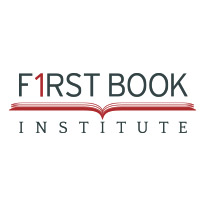
Every summer since 2013, the First Book Institute has been an incubator for cutting-edge work in American literary studies, providing a crucial space for early-career scholars to develop field-shaping monographs. Now in its tenth year, the Institute has been around long enough—and with more than enough success—for one to see its own shaping force on the field it stewards. “A decade ago there really wasn’t any space that existed—in any discipline—like the Institute,” co-director Sean Goudie reflects. “That’s still our reason ‘for being’ today; that hasn’t changed.”
 And yet if the Institute’s impact ten years ago was like an asteroid’s, crashing onto the scene and blazing a much-needed trail, now it has become somewhat more like a landmark’s, a reliable and indispensable resource that continues to define the paths of early-career Americanists, whether Institute alumni leaving its intense workshop space or newly-minted PhD graduates confronting the post-dissertation phase of their writing projects. Alden Sajor Marte-Wood, an Assistant Professor of English at Rice University and an upcoming participant in this summer’s Institute, was encouraged to apply by positive reviews from colleagues who are Institute alumni. Marte-Wood puts it nicely: “Ten years in, it’s clear the Institute’s stellar reputation now precedes itself.”
And yet if the Institute’s impact ten years ago was like an asteroid’s, crashing onto the scene and blazing a much-needed trail, now it has become somewhat more like a landmark’s, a reliable and indispensable resource that continues to define the paths of early-career Americanists, whether Institute alumni leaving its intense workshop space or newly-minted PhD graduates confronting the post-dissertation phase of their writing projects. Alden Sajor Marte-Wood, an Assistant Professor of English at Rice University and an upcoming participant in this summer’s Institute, was encouraged to apply by positive reviews from colleagues who are Institute alumni. Marte-Wood puts it nicely: “Ten years in, it’s clear the Institute’s stellar reputation now precedes itself.”
As the Institute remains committed to providing concrete guidance on revising a dissertation into a first-rate scholarly monograph, its core formula over the years has not varied, even as it remains responsive to changes in the publishing conditions of the academic market. Noting that academic presses are now looking for shorter books with more widespread appeal, for example, co-director Priscilla Wald reflects, “I’ve noticed over the years that we are talking more about writing style—not only avoiding jargon, which is always a good thing, but thinking about what makes writing engaging and how it can reach an audience beyond specialists.” 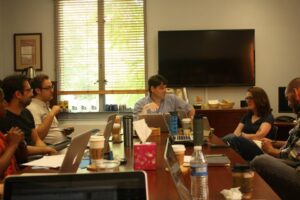 The Institute’s workshop format allows for this flexibility without sacrificing a strong concrete focus on participants’ own work. Thus, the workshops, in Goudie’s words “remain the heart and soul of the Institute.” And with good reason: the Institute has seen 32% of its participants to date publish a first book, and more than a quarter of these publications have come in the past year—an especially impressive feat given that, as Goudie explains, “University press budgets are tighter than they’ve ever been—even more so than a decade ago.”
The Institute’s workshop format allows for this flexibility without sacrificing a strong concrete focus on participants’ own work. Thus, the workshops, in Goudie’s words “remain the heart and soul of the Institute.” And with good reason: the Institute has seen 32% of its participants to date publish a first book, and more than a quarter of these publications have come in the past year—an especially impressive feat given that, as Goudie explains, “University press budgets are tighter than they’ve ever been—even more so than a decade ago.”
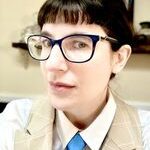 Jessica Hurley was a participant in the 2017 First Book Institute, when she was a Harper-Schmidt Fellow at the University of Chicago. In 2021, she published the project she workshopped in the Institute as her first book, Infrastructure of Apocalypse: American Literature and the Nuclear Complex, with the University of Minnesota Press. Now an Assistant Professor of English at George Mason University, Hurley describes the Institute as “transformative” in the process of revising and submitting her book manuscript. Of particular importance to Hurley was the workshop space, which enabled her to clarify critical elements of her manuscript. “It allowed me to see what my peers and experts in the field found compelling about the project, and I also learned a lot about the project itself in being forced to articulate it in new ways for this audience.” Significantly, the workshop’s impact for Hurley carried far beyond the seminar rooms in Burrowes Building. “The Institute,” explains Hurley, “gave me the roadmap that I used for all my future revisions.”
Jessica Hurley was a participant in the 2017 First Book Institute, when she was a Harper-Schmidt Fellow at the University of Chicago. In 2021, she published the project she workshopped in the Institute as her first book, Infrastructure of Apocalypse: American Literature and the Nuclear Complex, with the University of Minnesota Press. Now an Assistant Professor of English at George Mason University, Hurley describes the Institute as “transformative” in the process of revising and submitting her book manuscript. Of particular importance to Hurley was the workshop space, which enabled her to clarify critical elements of her manuscript. “It allowed me to see what my peers and experts in the field found compelling about the project, and I also learned a lot about the project itself in being forced to articulate it in new ways for this audience.” Significantly, the workshop’s impact for Hurley carried far beyond the seminar rooms in Burrowes Building. “The Institute,” explains Hurley, “gave me the roadmap that I used for all my future revisions.”
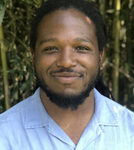 It is no surprise, then, that the workshop space continues to be a major appeal for prospective participants of the Institute. Cole Morgan, an Assistant Professor of English at the University of California, Irvine who will join Marte-Wood in June as a participant of the Institute, notes that he was “intrigued and motivated by the kinds of projects that seemed to have found footing in the Institute’s workshop.” Accordingly, Morgan looks forward to embracing the workshop environment as “an enormously generative space for thinking new ideas and posing new questions about works in progress that risk becoming too familiar to us.”
It is no surprise, then, that the workshop space continues to be a major appeal for prospective participants of the Institute. Cole Morgan, an Assistant Professor of English at the University of California, Irvine who will join Marte-Wood in June as a participant of the Institute, notes that he was “intrigued and motivated by the kinds of projects that seemed to have found footing in the Institute’s workshop.” Accordingly, Morgan looks forward to embracing the workshop environment as “an enormously generative space for thinking new ideas and posing new questions about works in progress that risk becoming too familiar to us.”
While book publication is what the Institute expressly prepares participants for, and thus is the most quantifiable metric of the Institute’s success, it does not encapsulate the full scope of the Institute’s positive impact. Indeed, one of the principal ways that the Institute’s influence continues to reverberate is through the scholarly community it has facilitated among participants. For Goudie and Wald, this was a totally unexpected—but welcome—development. “Candidly,” says Goudie, “the single-most inspiring outcome of the Institute for Priscilla and me over the past decade has been witnessing how the institute has created a community of like-minded scholars who remain in touch with one another well beyond the institute itself.” For Wald’s part, it is nothing short of “magical,” manifesting in the “congeniality, generosity and mutual respect” among alumni that reflects “the profession at its very best.”
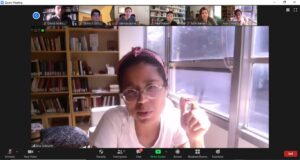 Institute alumni enthusiastically affirm Goudie and Wald’s observations. Ana Schwartz, an Assistant Professor of English at the University of Texas, Austin, was a participant in the 2020 First Book Institute, where she workshopped the project that is now her first book, Unmoored: The Search for Sincerity in Colonial America, forthcoming from the Omohundro Institute of Early American History out of the University of North Carolina Press. Schwartz cited her experience building connections with her Institute cohort as having a major impact on her work, both on the book project specifically and on her research more generally. From the relatively banal—“retweeting each other’s work on the bird app”—to the more intellectually strenuous, like exchanging feedback on works-in-progress, Schwartz emphasizes that “the collegiality among the participants has meant a lot to me since the workshop.” For Hurley, too, the Institute facilitated the formation of a close community among her cohort, “and that community,” she says, “has continued to shape my work as a scholar.”
Institute alumni enthusiastically affirm Goudie and Wald’s observations. Ana Schwartz, an Assistant Professor of English at the University of Texas, Austin, was a participant in the 2020 First Book Institute, where she workshopped the project that is now her first book, Unmoored: The Search for Sincerity in Colonial America, forthcoming from the Omohundro Institute of Early American History out of the University of North Carolina Press. Schwartz cited her experience building connections with her Institute cohort as having a major impact on her work, both on the book project specifically and on her research more generally. From the relatively banal—“retweeting each other’s work on the bird app”—to the more intellectually strenuous, like exchanging feedback on works-in-progress, Schwartz emphasizes that “the collegiality among the participants has meant a lot to me since the workshop.” For Hurley, too, the Institute facilitated the formation of a close community among her cohort, “and that community,” she says, “has continued to shape my work as a scholar.”
The field of American literary studies, in other words, is more than a collection of incisive monographs—it is also a community of, in Goudie’s words, “bold and courageous” scholars whose collaboration is a force of its own. As Hurley puts it, “it’s like seeing the future of the field as it emerges across these projects.” For Goudie, this collaborative element has a direct connection to participants’ success on the book market: “Their books are as outstanding as they are because of an important quality so many institute participants exhibit, something Priscilla and I look for in applications to the institute: namely, participants’ willingness to receive and respond to criticism of their work while providing much helpful advice to their peers about their projects.”
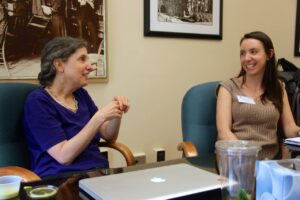 For the tenth time, Goudie and Wald are preparing to supervise this intense, and intensely generative critical dialogue. It is their own dialogue, however, that guarantees the Institute’s status as a fixture for the foreseeable future. “I plan to keep sponsoring the Institute under the auspices of CALS,” Goudie says, “so long as there is a need for it in the field and a willingness to respond to that need on the part of Penn State, the College of the Liberal Arts, and CALS—and so long as Priscilla is willing to serve as co-director of the Institute.” Wald, for her part, is already looking ahead to what future junior scholars in American literary studies may need, in the wake of a shrinking tenure-track job market. “Many still want to turn their dissertations into books, but I don’t yet know how participants’ expectations for those books might change. So I want to keep thinking about how we might best continue to address these changing circumstances.” The last ten years in American literary studies may not resemble the next ten, but one thing is certain: the First Book Institute, under the direction of Goudie and Wald, will have a hand in the future that emerges.
For the tenth time, Goudie and Wald are preparing to supervise this intense, and intensely generative critical dialogue. It is their own dialogue, however, that guarantees the Institute’s status as a fixture for the foreseeable future. “I plan to keep sponsoring the Institute under the auspices of CALS,” Goudie says, “so long as there is a need for it in the field and a willingness to respond to that need on the part of Penn State, the College of the Liberal Arts, and CALS—and so long as Priscilla is willing to serve as co-director of the Institute.” Wald, for her part, is already looking ahead to what future junior scholars in American literary studies may need, in the wake of a shrinking tenure-track job market. “Many still want to turn their dissertations into books, but I don’t yet know how participants’ expectations for those books might change. So I want to keep thinking about how we might best continue to address these changing circumstances.” The last ten years in American literary studies may not resemble the next ten, but one thing is certain: the First Book Institute, under the direction of Goudie and Wald, will have a hand in the future that emerges.

Every summer since 2013, the First Book Institute has been an incubator for cutting-edge work in American literary studies, providing a crucial space for early-career scholars to develop field-shaping monographs. Now in its tenth year, the Institute has been around long enough—and with more than enough success—for one to see its own shaping force on the field it stewards. “A decade ago there really wasn’t any space that existed—in any discipline—like the Institute,” co-director Sean Goudie reflects. “That’s still our reason ‘for being’ today; that hasn’t changed.”
 And yet if the Institute’s impact ten years ago was like an asteroid’s, crashing onto the scene and blazing a much-needed trail, now it has become somewhat more like a landmark’s, a reliable and indispensable resource that continues to define the paths of early-career Americanists, whether Institute alumni leaving its intense workshop space or newly-minted PhD graduates confronting the post-dissertation phase of their writing projects. Alden Sajor Marte-Wood, an Assistant Professor of English at Rice University and an upcoming participant in this summer’s Institute, was encouraged to apply by positive reviews from colleagues who are Institute alumni. Marte-Wood puts it nicely: “Ten years in, it’s clear the Institute’s stellar reputation now precedes itself.”
And yet if the Institute’s impact ten years ago was like an asteroid’s, crashing onto the scene and blazing a much-needed trail, now it has become somewhat more like a landmark’s, a reliable and indispensable resource that continues to define the paths of early-career Americanists, whether Institute alumni leaving its intense workshop space or newly-minted PhD graduates confronting the post-dissertation phase of their writing projects. Alden Sajor Marte-Wood, an Assistant Professor of English at Rice University and an upcoming participant in this summer’s Institute, was encouraged to apply by positive reviews from colleagues who are Institute alumni. Marte-Wood puts it nicely: “Ten years in, it’s clear the Institute’s stellar reputation now precedes itself.”
As the Institute remains committed to providing concrete guidance on revising a dissertation into a first-rate scholarly monograph, its core formula over the years has not varied, even as it remains responsive to changes in the publishing conditions of the academic market. Noting that academic presses are now looking for shorter books with more widespread appeal, for example, co-director Priscilla Wald reflects, “I’ve noticed over the years that we are talking more about writing style—not only avoiding jargon, which is always a good thing, but thinking about what makes writing engaging and how it can reach an audience beyond specialists.”  The Institute’s workshop format allows for this flexibility without sacrificing a strong concrete focus on participants’ own work. Thus, the workshops, in Goudie’s words “remain the heart and soul of the Institute.” And with good reason: the Institute has seen 32% of its participants to date publish a first book, and more than a quarter of these publications have come in the past year—an especially impressive feat given that, as Goudie explains, “University press budgets are tighter than they’ve ever been—even more so than a decade ago.”
The Institute’s workshop format allows for this flexibility without sacrificing a strong concrete focus on participants’ own work. Thus, the workshops, in Goudie’s words “remain the heart and soul of the Institute.” And with good reason: the Institute has seen 32% of its participants to date publish a first book, and more than a quarter of these publications have come in the past year—an especially impressive feat given that, as Goudie explains, “University press budgets are tighter than they’ve ever been—even more so than a decade ago.”
 Jessica Hurley was a participant in the 2017 First Book Institute, when she was a Harper-Schmidt Fellow at the University of Chicago. In 2021, she published the project she workshopped in the Institute as her first book, Infrastructure of Apocalypse: American Literature and the Nuclear Complex, with the University of Minnesota Press. Now an Assistant Professor of English at George Mason University, Hurley describes the Institute as “transformative” in the process of revising and submitting her book manuscript. Of particular importance to Hurley was the workshop space, which enabled her to clarify critical elements of her manuscript. “It allowed me to see what my peers and experts in the field found compelling about the project, and I also learned a lot about the project itself in being forced to articulate it in new ways for this audience.” Significantly, the workshop’s impact for Hurley carried far beyond the seminar rooms in Burrowes Building. “The Institute,” explains Hurley, “gave me the roadmap that I used for all my future revisions.”
Jessica Hurley was a participant in the 2017 First Book Institute, when she was a Harper-Schmidt Fellow at the University of Chicago. In 2021, she published the project she workshopped in the Institute as her first book, Infrastructure of Apocalypse: American Literature and the Nuclear Complex, with the University of Minnesota Press. Now an Assistant Professor of English at George Mason University, Hurley describes the Institute as “transformative” in the process of revising and submitting her book manuscript. Of particular importance to Hurley was the workshop space, which enabled her to clarify critical elements of her manuscript. “It allowed me to see what my peers and experts in the field found compelling about the project, and I also learned a lot about the project itself in being forced to articulate it in new ways for this audience.” Significantly, the workshop’s impact for Hurley carried far beyond the seminar rooms in Burrowes Building. “The Institute,” explains Hurley, “gave me the roadmap that I used for all my future revisions.”
 It is no surprise, then, that the workshop space continues to be a major appeal for prospective participants of the Institute. Cole Morgan, an Assistant Professor of English at the University of California, Irvine who will join Marte-Wood in June as a participant of the Institute, notes that he was “intrigued and motivated by the kinds of projects that seemed to have found footing in the Institute’s workshop.” Accordingly, Morgan looks forward to embracing the workshop environment as “an enormously generative space for thinking new ideas and posing new questions about works in progress that risk becoming too familiar to us.”
It is no surprise, then, that the workshop space continues to be a major appeal for prospective participants of the Institute. Cole Morgan, an Assistant Professor of English at the University of California, Irvine who will join Marte-Wood in June as a participant of the Institute, notes that he was “intrigued and motivated by the kinds of projects that seemed to have found footing in the Institute’s workshop.” Accordingly, Morgan looks forward to embracing the workshop environment as “an enormously generative space for thinking new ideas and posing new questions about works in progress that risk becoming too familiar to us.”
While book publication is what the Institute expressly prepares participants for, and thus is the most quantifiable metric of the Institute’s success, it does not encapsulate the full scope of the Institute’s positive impact. Indeed, one of the principal ways that the Institute’s influence continues to reverberate is through the scholarly community it has facilitated among participants. For Goudie and Wald, this was a totally unexpected—but welcome—development. “Candidly,” says Goudie, “the single-most inspiring outcome of the Institute for Priscilla and me over the past decade has been witnessing how the institute has created a community of like-minded scholars who remain in touch with one another well beyond the institute itself.” For Wald’s part, it is nothing short of “magical,” manifesting in the “congeniality, generosity and mutual respect” among alumni that reflects “the profession at its very best.”
 Institute alumni enthusiastically affirm Goudie and Wald’s observations. Ana Schwartz, an Assistant Professor of English at the University of Texas, Austin, was a participant in the 2020 First Book Institute, where she workshopped the project that is now her first book, Unmoored: The Search for Sincerity in Colonial America, forthcoming from the Omohundro Institute of Early American History out of the University of North Carolina Press. Schwartz cited her experience building connections with her Institute cohort as having a major impact on her work, both on the book project specifically and on her research more generally. From the relatively banal—“retweeting each other’s work on the bird app”—to the more intellectually strenuous, like exchanging feedback on works-in-progress, Schwartz emphasizes that “the collegiality among the participants has meant a lot to me since the workshop.” For Hurley, too, the Institute facilitated the formation of a close community among her cohort, “and that community,” she says, “has continued to shape my work as a scholar.”
Institute alumni enthusiastically affirm Goudie and Wald’s observations. Ana Schwartz, an Assistant Professor of English at the University of Texas, Austin, was a participant in the 2020 First Book Institute, where she workshopped the project that is now her first book, Unmoored: The Search for Sincerity in Colonial America, forthcoming from the Omohundro Institute of Early American History out of the University of North Carolina Press. Schwartz cited her experience building connections with her Institute cohort as having a major impact on her work, both on the book project specifically and on her research more generally. From the relatively banal—“retweeting each other’s work on the bird app”—to the more intellectually strenuous, like exchanging feedback on works-in-progress, Schwartz emphasizes that “the collegiality among the participants has meant a lot to me since the workshop.” For Hurley, too, the Institute facilitated the formation of a close community among her cohort, “and that community,” she says, “has continued to shape my work as a scholar.”
The field of American literary studies, in other words, is more than a collection of incisive monographs—it is also a community of, in Goudie’s words, “bold and courageous” scholars whose collaboration is a force of its own. As Hurley puts it, “it’s like seeing the future of the field as it emerges across these projects.” For Goudie, this collaborative element has a direct connection to participants’ success on the book market: “Their books are as outstanding as they are because of an important quality so many institute participants exhibit, something Priscilla and I look for in applications to the institute: namely, participants’ willingness to receive and respond to criticism of their work while providing much helpful advice to their peers about their projects.”
 For the tenth time, Goudie and Wald are preparing to supervise this intense, and intensely generative critical dialogue. It is their own dialogue, however, that guarantees the Institute’s status as a fixture for the foreseeable future. “I plan to keep sponsoring the Institute under the auspices of CALS,” Goudie says, “so long as there is a need for it in the field and a willingness to respond to that need on the part of Penn State, the College of the Liberal Arts, and CALS—and so long as Priscilla is willing to serve as co-director of the Institute.” Wald, for her part, is already looking ahead to what future junior scholars in American literary studies may need, in the wake of a shrinking tenure-track job market. “Many still want to turn their dissertations into books, but I don’t yet know how participants’ expectations for those books might change. So I want to keep thinking about how we might best continue to address these changing circumstances.” The last ten years in American literary studies may not resemble the next ten, but one thing is certain: the First Book Institute, under the direction of Goudie and Wald, will have a hand in the future that emerges.
For the tenth time, Goudie and Wald are preparing to supervise this intense, and intensely generative critical dialogue. It is their own dialogue, however, that guarantees the Institute’s status as a fixture for the foreseeable future. “I plan to keep sponsoring the Institute under the auspices of CALS,” Goudie says, “so long as there is a need for it in the field and a willingness to respond to that need on the part of Penn State, the College of the Liberal Arts, and CALS—and so long as Priscilla is willing to serve as co-director of the Institute.” Wald, for her part, is already looking ahead to what future junior scholars in American literary studies may need, in the wake of a shrinking tenure-track job market. “Many still want to turn their dissertations into books, but I don’t yet know how participants’ expectations for those books might change. So I want to keep thinking about how we might best continue to address these changing circumstances.” The last ten years in American literary studies may not resemble the next ten, but one thing is certain: the First Book Institute, under the direction of Goudie and Wald, will have a hand in the future that emerges.